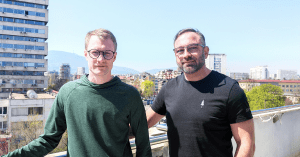As companies move from outsourcing aimed at cutting costs to partnerships that add strategic value, Eastern Europe, led by Romania, is emerging as a hub for expertise-driven solutions. Competitive pricing in places like India initially drew some work away from Romania. But now, clients frustrated by cultural misalignment and legal hurdles in parts of Asia are shifting back, seeking Romania’s more advanced software and technology capabilities.
While some have suggested that Romania should transition from providing outsourced services to developing and selling products, the shift to products presents significant challenges. Product development requires substantially more upfront capital and robust marketing expertise to effectively position and promote products globally.
Statistically, only a small fraction of product initiatives successfully move from planning to profitability, meaning much of the initial investment would not yield returns. Consequently, the leap to product-based revenue models may not be financially viable for most Romanian firms.
A more feasible strategy for Romania lies in further developing sophisticated, strategic outsourcing solutions that align with the evolving demands of global clients. Romanian providers are focusing on high-value expertise, realizing that competing on price alone is no longer sustainable.
By delivering quality levels that surpass many Asia-based services and cost advantages over Western providers, Romania has the potential to redefine itself within the outsourcing market. Specializing in artificial intelligence, cybersecurity, fintech, and healthcare, Romania’s outsourcing sector is evolving toward advanced, industry-specific services, a pivot likely to solidify its role as a key partner in global outsourcing strategies for 2025 and beyond.
Yet, an abrupt shift from outsourcing to product development could destabilize Romania’s software sector. Moving to products requires capital, marketing skills, and a tolerance for failure that many firms aren’t prepared for. A gradual approach focused on higher-value outsourcing may be Romania’s best path to sustainable growth without risking unproven products.
Evolving pricing models
In 2025, outsourcing is shifting from low-cost labour to partnerships that deliver long-term value. Eastern Europe’s outsourcing market, particularly in Romania, reflects this trend through a shift to outcome-based pricing. Rather than being paid for hours worked, service providers are compensated based on measurable results, aligning goals and incentivizing efficiency and innovation.
This shift toward outcome-based models includes gainsharing arrangements, where the financial benefits of greater efficiency or innovation are divided between client and provider. Such models encourage closer collaboration, with both parties focused on maximizing operational savings and creating mutual value beyond simple cost reduction.
In addition to gainsharing, many strategic services are now structured through monthly retainers, offering providers steady revenue and clients consistent support. Some firms are also exploring co-investment opportunities, where clients and providers share the risks and potential rewards of developing new solutions.
The rise of AI-driven solutions
In Romania, artificial intelligence usage is gaining ground, projected to boost productivity and add an estimated 5% to GDP over the next decade. This mirrors a broader global trend: according to the Adecco Group’s 2024 report, 63% of companies worldwide plan to increase their AI investments over the next two years, indicating that AI integration is shifting from an advantage to a necessity.
Romanian firms, particularly service providers, are pushing beyond simple automation. Investments increasingly focus on advanced applications such as data analytics, predictive modelling, and customer service solutions. This shift aligns with the growing expectations of clients seeking greater efficiency and insight from AI. However, high costs remain a significant constraint. In the Adecco survey, 61% of companies cited the expense of AI tools as a barrier to wider adoption, suggesting that while the appetite for AI is strong, financial hurdles could slow progress.
Despite these challenges, AI is widely seen as essential for maintaining competitiveness. According to the Adecco report, 72% of global executives believe that companies failing to integrate AI effectively will risk falling behind.
Recognizing this shift, Romanian providers are working to offer AI-driven services that enhance efficiency and innovation. Clients using AI report faster turnaround times and more strategic insights—two advantages in high demand within a competitive market.
Cost reduction and efficiency gains through AI
With economic pressures mounting, cost reduction is set to become a priority in 2025 as companies respond to rising interest rates, persistent inflation, and cautious growth forecasts. AI adoption is expected to deliver both cost savings and efficiency gains, offering a practical solution for firms aiming to streamline operations. By automating routine tasks and enhancing productivity, AI allows Romanian providers faster, more efficient services.
In AI-driven projects, data processing times have improved by up to 30%, while predictive analytics tools enable more accurate decision-making. As AI becomes more accessible and affordable, Romanian outsourcing firms are positioned to support clients’ growing need for cost efficiency and operational agility. AI-driven insights help clients improve productivity, forecasting accuracy, and risk management, making it a valuable tool for navigating a challenging economic landscape.
Expansion of nearshoring: A hybrid approach
Nearshoring, the practice of outsourcing to geographically closer countries, is gaining momentum as companies prioritize communication, collaboration, and cultural alignment. Romania’s location makes it an ideal nearshoring partner for Western European firms, offering both time zone compatibility and lower costs than Western Europe.
However, a twist on the traditional nearshoring model is emerging. Many companies are now integrating offshore project managers within their nearshore teams, creating a hybrid model that combines the cost advantages of offshoring with the operational cohesion of nearshoring.
Research by Stanford University underscores the financial benefits of this approach. In one example, a company that shifted its developer team from the Bay Area to Poland achieved a 40% reduction in annual engineering costs, dropping from $12.3 million to $7.4 million—while maintaining 98% of the original output. This blend of local oversight and offshore labour reflects Romania’s adaptability and its providers’ commitment to meeting complex client needs while balancing cost and efficiency.
Demand for niche expertise in fintech, healthcare, and legal services
Outsourcing providers in 2025 are shifting toward specialization as demand rises for sector-specific expertise in fintech, healthcare, defense, and cybersecurity. These sectors, fueled by escalating security concerns, are seeing the strongest growth.
Companies capable of transforming these industries with AI and other disruptive technologies are challenging established players, reshaping the competitive landscape.
Industries that require tailored solutions, strict compliance, and specialized expertise increasingly find generalist outsourcing providers inadequate. In response, Romanian firms have built specialized teams and compliance-focused capabilities to address these needs. As more businesses seek partners with deep industry knowledge, Romania’s shift toward niche expertise solidifies its role as a provider of high-value, complex solutions.
Build-Operate-Transfer (BOT) model gains popularity
The Build-Operate-Transfer (BOT) model is emerging as a favored strategy for companies aiming to scale operations with limited risk. BOT allows firms to build an offshore team, manage it directly, and transfer ownership once the team is stable. While BOT involves an initial investment, it can lower long-term costs and support strategic growth.
In Romania, outsourcing providers are adopting the BOT model to help clients scale teams while keeping a firm grip on quality and operations. The BOT model lets companies establish a long-term foothold with lower upfront risks, making it an attractive option for those seeking a more permanent presence.
However, compared to traditional time-and-material contracts, the BOT model is a lower-margin business for Romanian providers. With less flexibility to adjust rates over time, this setup often squeezes profits, challenging firms to balance client needs with sustainable returns.
Rising demand for specialized teams
Demand for specialized teams over general labour signals a shift in outsourcing from basic staffing to industry-specific expertise. Romania’s outsourcing firms now offer dedicated teams with deep knowledge in sectors like healthcare and finance, allowing them to deliver high-quality solutions that meet the complex requirements of these fields.
By prioritizing specialized expertise over sheer headcount, Romanian providers position themselves as partners capable of delivering strategic value. This approach appeals to clients in sectors demanding compliance, security, and efficiency.
In 2025, Eastern Europe is expected to redefine its outsourcing model as companies move from cost-saving tactics to strategic partnerships. While AI and niche expertise attract firms seeking innovation, the costs of these advanced services and high inflation could slow adoption. Nearshoring provides a blend of cost savings and operational efficiency, yet the need for expense control remains strong. This shift from price competition to value creation positions Eastern Europe well for the next phase of the global economy.








